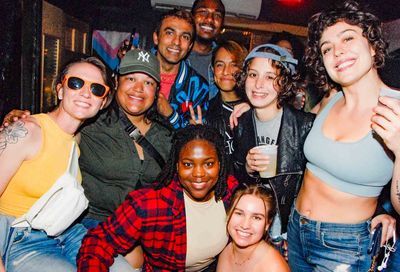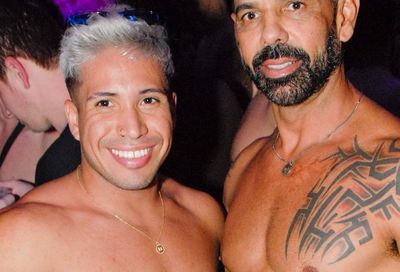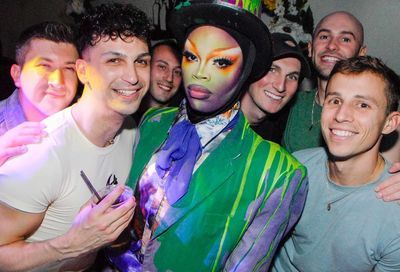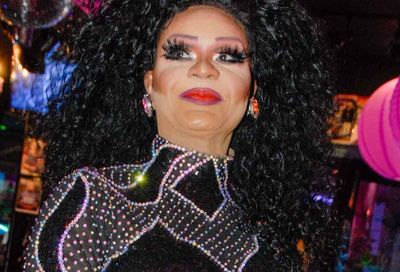It Takes a Village
For Playwright Tarell Alvin McCraney It's All About Community
It would be very easy to talk about playwright Tarell Alvin McCraney’s rise with the same kind of mythic spin as his ”Brother/Sister” trilogy. His path to prominence reads like a fairy tale, from city streets to international stages.
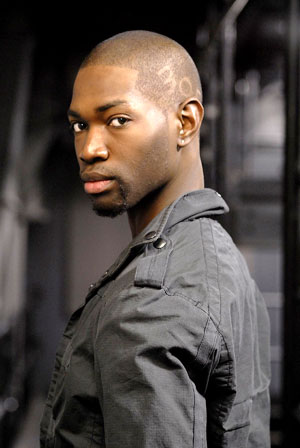
Tarell Alvin McCraney
It’s also very easy to get swept up in listening to McCraney speak, the rhythm and passion of his personal narrative as infectious as the plays he writes.
He will often punctuate a thought with ”you know,” only noticeable because it comes up early in our conversation. ”In New Orleans, people tell you stories all the time and they want you to invest in those stories. They always say, ‘You see what I’m saying?’ Or, ‘You know what I mean?’ They want you to be right there. I think it’s a very American tradition, especially a Southern-American tradition. That’s the way we tell stories.”
It’s McCraney’s own gift for telling stories that’s gained him much-deserved attention, and his talent for narrative that allows him to draw you in and capture your attention. There is something so casual, so open, yet so intriguing about the expression of his ideas. Perhaps it is simply because McCraney is not trying to impress you, despite the fact that his résumé will absolutely do so.
Raised in Miami’s Liberty City housing projects, McCraney is now the International Writer in Residence at the Royal Shakespeare Company, a winner of the Whiting Award and The New York Times inaugural Outstanding Playwright Award, a recipient of Princeton University’s Hodder Fellowship and an individual whose work was nominated for London’s Olivier Award.
McCraney is also a member of, among other companies (including the famed Steppenwolf Ensemble and the New Dramatists), Teo Castellanos/D-Projects in Miami.
It was through actor/writer/director Castellanos, as a teenager still living in Liberty City, that McCraney’s dramatic voice began to take shape, performing his own work at youth detention and rehabilitation centers. The fact that McCraney still has strong ties to Castellanos’s dance and theater company and that South Florida community is far from accidental and much more than an obligatory nod to his past.
”I never want to ‘make it out’ of my community,” he says. “I just want to survive it. If you look in the press at the neighborhood that I’m from it is amazingly violent right now, and it has been for the past 10 to 15 years. There are young people who, at my age, are literally not surviving.
”If there’s a way to create a vent for that community in Miami,” he continues, “if there’s a way to create a voice that could allow that environment to be assuaged or allow people to be elsewhere, doing something rather than being in a vicinity where they could be shot or killed, it’s important for us to do that. No play is going to save anybody’s life. Writing a play and putting a play up doesn’t save anybody’s life. But if you experience that, it’s allowing someone to sit over there and consciously forge ahead in their own imagination. That may give them the idea, that may give them the strength, the clarity, to save their own lives. That’s important to me.
”So, it may not be, you know, a cure for cancer. The gifts that I have they may be small in comparison. They may be smaller than, say, being a real-estate agent who could come in and buy up land and build something, but creating a theater where people could have access to the arts in a way that they didn’t before. Even if that saves one life, I feel like that’s done mountains of work.”
From Liberty City and the New World School of the Arts High School, McCraney would eventually earn an M.F.A. in playwriting from the Yale School of Drama. It was at Yale that what would become the “Brother/Sister Plays” – comprised of The Brothers Size, In the Red and Brown Water and Marcus; Or the Secret of Sweet, all of which have been performed at D.C.’s Studio Theatre – first began to take shape.
METRO WEEKLY: How did The Brother/Sister Plays begin? Did you always intend to write them as a trilogy?
TARELL ALVIN MCCRANEY: The plays didn’t start out as a body of work. The work started with The Brothers Size – which is the second play chronologically of the three – but it was the first play written. I wanted to write a play that was like music, a trio for three men of color. The notion was to have a moment where three men told a story as one voice.
So, it all only started as that one piece. I only recognized later that I was opening up from that trio into a more communal piece. I was off at Oxford and my mother had just recently passed away and I was having terrible jet lag at night, so I just was writing all sorts of things. Once I went back and read the work that I had been writing, I realized that I had moved from the more intimate chamber piece of this trio into this larger, sort of community choral, which was In the Red and Brown Water.
MW: You’ve said it was while you were in New Orleans working on a piece called The Breach that you began to craft the final third of your trilogy, Marcus; Or the Secret of Sweet, telling the story of a 16-year-old boy struggling to come to terms with not just his own sexuality, but with visions that have begun to come to him in his dreams.
MCCRANEY: The Breach was to mark the one-year anniversary of Hurricane Katrina. While I was there meeting with people, I started to just try, in the piece that I was writing, to talk about a community of boys again, but I also realized that I wanted to talk about a singular voice. I wanted to talk about how a singular voice in the community can rise above without, you know, being separated.
I’m now realizing as I say it, but Marcus certainly came out of trying to find a way for me to talk about the voice of a community. There’s a choral voice and there’s that singular voice. How do they mash up and meet? How do they sometimes work together and not work together?
I mean, the character of Marcus is sort of like, ”Oh, everybody’s going to say I’m gay.” Well, everybody’s been saying that he’s ”sweet,” that he’s gay, from the beginning of the play. It’s not that big of a dilemma. Pretty much everybody knows. It’s not that big a deal, you know what I mean?
It’s not that coming out is not a hard thing. But, I think, coming out to one’s self is probably harder than anything else because the piece that you’ve got to find in order to do that, it’s so extraordinary. I think that’s the greatest step. Then everybody else you can sort of deal with because you don’t have to deal with them constantly. It’s yourself you’ve got to deal with all the time. It’s the voice in your mind.
Marcus is a coming-out play. Some people are like, ”Well, you shouldn’t say that.” But it is a coming-out play, although it’s more a coming-out play for everybody because at some point in all of our lives, what happens is we all say, ”This is the thing I’m going to stand up for and these are the things that I am not.”
I think it’s not just as brave, but equally as hard to say something like, ”I have dreams.” I mean people lock you up for those things! You know, they used to lock you up for saying that you’re homosexual, but they don’t do that anymore. So if Marcus comes out and says, ”I’m gay,” that’s, you know, it’s a pretty big thing. It’s a big deal and there are repercussions that come with that. But you, going up to a man and saying, ”Hey! Your brother, who’s been missing, is in my dreams and he’s telling me these messages to give to you,” I think that’s pretty brave too. And I think saying that with conviction, saying, ”Look, I don’t care if you believe me or not, I’m telling you,” and then getting someone to believe you saying that, I think that’s just as important.
So, for me, Marcus is about accepting all of his gifts, charms, secrets. It’s about saying, ”You know, I’m a part of this community.”
MW: Was your own coming-out process at all like what Marcus goes through?
MCCRANEY: Well, my coming-out process was very different than Marcus’s. The dream is actually closer to me than the coming-out part is, to be quite honest.
MW: Really?
MCCRANEY: Yeah. I’m sure that will come back to haunt me someday.
Marcus’s coming-out process was so fun, in a way. I mean a part of that had more to do with watching, you know, watching young people come out of the closet and be ridiculed or, you know, commit suicide. There are certainly rough times for Marcus. There are things that people say that hurt him. But there also is a community that seems to find, without being able to sort of throw him a ticker-tape parade, a way to let him into the grooves of that community. I think that it’s important to show an example of a community, especially an African-American community, being able to say, ”You know what, we’ve had people like you in this community before. We will have people like you again and there’s no reason for you to leave our community or this earth because some people don’t necessarily conform or think what you are is perfectly understandable, because some people don’t get you. Because some people don’t get a lot of us.”
There’s an outsider who comes into Marcus’s life who sort of catches his eye for a second. But then Marcus realizes the safety he has is within his community. That there will always be a place to find that kind of support within that community.
So, for me, that part of Marcus was not like my coming-out at all. But the part about the dreams, that having a dream and having something, you know, that you feel like the community is calling for you to do is real. Because I feel like my community is asking me to do a lot even in the face of not being absolutely recognized as a part of it. It’s still the community that cries out for me to do, to take a stand on things and make it a better community. In that part, I identify with Marcus absolutely.
It’s not about whether or not the GLBT community needs me or not. They have me, whether they like it or not. And it’s not whether or not the black community or the urban community or, specifically, Liberty City, needs me or not. They’ve got me whether they like me or not. For me, it’s not about trying to be, it just is. Because, for me, I have no choice but to be a part of these communities, whether I like it or not. I would rather do what I can to make them, in my mind, places of peace and support rather than places of conflict and derision. But that’s just my stand, I’m sure that there are other people who you could ask who would feel differently.
MW: You have what some would consider an embarrassment of riches right now. There are a number of projects that you’re working on and I’m wondering what that must be like for you.
MCCRANEY: It’s a very daunting task. I’m glad people see it as an embarrassment of riches. I actually think of it as having bitten off more than I can chew, if I’m being really honest.
The reason that it happens is because the euphoria of the play is so wonderful I forget how much work it actually takes. At the end of the day, I’m doing things and thinking to myself, ”Why can’t I focus on this project the way I want to?” Well, it’s because I’m doing three other projects at the same time. No one teaches you this. When we talk about creativity, we talk about it being boundless and limitless, but creativity is directly attached to your actual physical exhaustion. Meaning if you get exhausted, you will not be creative anymore. If you are tired, you cannot be creative and it shuts down, it stops. Now, those that know, know that the bounds of creativity are limitless. When it’s working, it’s the closest that we can get to understanding immortality. But the notion of it working when you’re humanly tired, when your mortal coil is recoiling as it were, it just doesn’t happen. When I’m tired or when I exhaust myself, which I do quite often, there’s nothing I can do. All I can do is to sit back and wait, rest. That’s something you have to learn. Some people have to learn the hard way, and that’s one of things I’m doing.
MW: Of the projects that you’re working on right now, is there one that you’re feeling particularly close to? Is there a favorite?
MCCRANEY: They only become a favorite when they [are onstage]. So, you know, it’s hard to say when they are in this embryonic state. For instance, In the Red and Brown Water was my favorite, but only after all three of the plays had already gone up. Before that, I didn’t know what they were. Until I saw a production of In the Red and Brown Water I didn’t know, and then I couldn’t stop going to see it when there was a production of it. You know, every time someone does it I’m breaking my neck to get there to see it because it’s my favorite.
MW: I love that you say that because so few playwrights ever own up to that. There’s that kind of aloof, ”Oh, I don’t like to go. I can barely stand to watch it.” I love that you’ve gone to see one of your shows multiple times and you still love to see it.
MCCRANEY: Oh, yeah, Red and Brown, I go watch. Especially, you know, there are certain productions of it that I could watch 90 times. Tina Landau’s production of Red and Brown, when we did it in Atlanta, I watched every show that I was in town for. Even if I was home and thought, ”I don’t have to go see it,” or, ”I can just go for part of it, maybe sneak out during intermission,” or something. But I would go and stay because it was really thrilling to watch because the actors were having such a good time. That cast was just crazy to watch.
I even came in to Studio Theatre after that huge blizzard last year. Everything was shut down. I got the first flight out of Miami that morning to D.C. to come walk over the snow down to Studio to see Red and Brown. I was very happy I did.
I love Marcus and I think it’s an incredible play. I love to see how much fun people have with it. And I like Brothers Size a lot, though Brothers Size is one of those plays that, because of the way I worked it, I will always feel like I’m working on it in my mind. Every time I go I feel like I’m back at work and that’s exhausting. [Laughs.] So that’s why I don’t like Brothers Size as much.
MW: Is there something, maybe when people are seeing your work, that you’d like them to know? Something you’d like to lay out for them about what you’re doing?
MCCRANEY: Oh, no. Sometimes we have those ”talk backs” after a show and people are like, ”What are you saying?” I always feel like, ”Lady or gentleman, I have been saying that thing that I’m saying for the past, you know, how long you’ve been sitting here? An hour and a half? In fact, I want you to tell me what you think I’ve been saying. Or, in fact, I’m less interested in what you think I’m saying and more interested in hearing what this play is saying to you and what you want to say about it or to it. I’m much more interested in that.
Every time I go to a talk back, people will say, ”I didn’t like this and you didn’t do that.” And I’ll say, ”Okay,” and that sort of makes some people mad that I’m not defending anything. But what do I have to defend? I just spent an hour and a half telling you my idea and showing you the most intimate parts of me. What more do you want me to say? And now you’re saying to me either the things you liked or didn’t like and I’m listening. I accept that and I understand that.
Now, if there’s something you want to engage with me about or have a deeper conversation about, then sure, I can do that. But I’m going to make you do the talking. I’m very much a Libran in that way. We have to have some balance around here. I can’t do all the talking for four and a half hours and then talk some more. That’s crazy.
MW: It’s funny, since we were talking about the “Brother/Sister Plays” in musical terms, that Brothers Size was a trio for three voices, because when audiences see jazz performed or classical music performed they seem more open to accepting the idea that they will walk away with their own ideas about what something was, or what it meant.
MCCRANEY: Yes.
MW: But when it comes to theater there is almost this discomfort. Did I understand the play correctly? Do I know what the playwright is saying? As though it’s a quiz.
MCCRANEY: It’s because of the word. Because we, as a society, are less literate. Actually, there’s no way around that word. We are less literate so, when we see words, we say ”test.” Somebody is testing me. They’re trying to see if I’m smart enough to get it. Sometimes that’s why some of the Churchill plays, some of the Beckett plays, that’s why some of the more absurd and avant-garde works are incredible because they make you go, ”These words don’t mean anything.” They mean 10 percent of what they’re actually trying to define, but listen to the rhythm. Listen to how they come out. Listen to the musicality of it, because those things at the base will tell you so much more.
You know, you can say ”yes” in a hundred different ways but what it really means depends on how fast the word comes out. Does it come in repetition? How loudly is it spoken? Where is the question mark and so on.
We get so caught up on the word sometimes that we forget that there’s so much more happening. Which is why when people say, ”Oh, you’re so poetic,” I think, ”Thanks, but I’ve got really great actors.” I have actors who are using the word as a guide, and then they put that word into their bodies and move with it and allow it to be more than just words, more than some sort of a portrait on a page.
There are other writers who are actually far more poetic than I am. I think, Katori Hall [The Mountaintop] and Marcus Gardley [let every tongue confess] who just had a play in D.C. [at Arena Stage] — I mean that man is a true poet. You know what I mean? You can read his work just on the page and be like, ”Wow, this is incredible poetry.”
I don’t necessarily come from that background. I come from a place where I’m definitely interested in what the words in the space do to the body. And so for me it’s less about yeah, I came away with this notion and this notion and this notion. And, that’s nice. But what did you feel? Where did it take you? Did it remind you of anything in your life where you’ve been in a situation like that physically, mentally, emotionally, imaginatively? That’s much more important to me, to have people talking about or thinking about when they come away from a play, than, ”Well, Tarell wants me to think about this.” I can’t think of anything worse.
Marcus; Or the Secret of Sweet runs at Studio Theatre, 1501 14th St. NW, through Feb. 20. For tickets, $35-$65, call 202-332-3300 or visit studiotheatre.org. Metro Weekly will be hosting a special talk back, moderated by Sean Bugg, following the Sunday, Feb. 13 matinee. Group discounts available. To purchase tickets, call 202-332-3300.
Support Metro Weekly’s Journalism
These are challenging times for news organizations. And yet it’s crucial we stay active and provide vital resources and information to both our local readers and the world. So won’t you please take a moment and consider supporting Metro Weekly with a membership? For as little as $5 a month, you can help ensure Metro Weekly magazine and MetroWeekly.com remain free, viable resources as we provide the best, most diverse, culturally-resonant LGBTQ coverage in both the D.C. region and around the world. Memberships come with exclusive perks and discounts, your own personal digital delivery of each week’s magazine (and an archive), access to our Member's Lounge when it launches this fall, and exclusive members-only items like Metro Weekly Membership Mugs and Tote Bags! Check out all our membership levels here and please join us today!



















